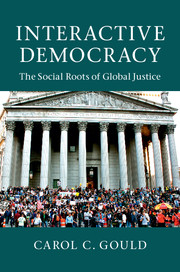Book contents
- Frontmatter
- Dedication
- Contents
- Acknowledgements
- Introduction
- Part I A theoretical framework
- Part II The social roots of global justice
- 5 Transnational solidarities
- 6 Does global justice presuppose global solidarity?
- 7 Recognition and care in global justice
- 8 Gender equality, culture, and the interpretation of human rights
- 9 The sociality of free speech: the case of humor across cultures
- 10 Violence, power-with, and the human right to democracy
- Part III Interactive democracy – transnational, regional, global
- Works cited
- Index
- References
6 - Does global justice presuppose global solidarity?
Published online by Cambridge University Press: 05 September 2014
- Frontmatter
- Dedication
- Contents
- Acknowledgements
- Introduction
- Part I A theoretical framework
- Part II The social roots of global justice
- 5 Transnational solidarities
- 6 Does global justice presuppose global solidarity?
- 7 Recognition and care in global justice
- 8 Gender equality, culture, and the interpretation of human rights
- 9 The sociality of free speech: the case of humor across cultures
- 10 Violence, power-with, and the human right to democracy
- Part III Interactive democracy – transnational, regional, global
- Works cited
- Index
- References
Summary
Introduction
The preceding analysis of transnational solidarities enables us to confront here a troubling objection frequently posed to the very possibility of global justice. The objection is that global justice is impossible because it would require global solidarity among everyone worldwide in order to support obligations to redistribute resources and wealth at that scale, or at least to motivate people to care about something like alleviating or mitigating extreme poverty. But since solidarity cannot have global or universalistic applicability, the objection proceeds, global justice itself is an impossible goal. The global irrelevance of solidarity has been posited on several grounds: First, because solidarity is taken in its older sense as applying primarily among people within a delimited national community, involving a shared national identity and a reciprocity of benefits and burdens; or because solidarity is thought to have an inherently particularistic meaning that entails an antagonistic relation to others against whom the solidarity group acts; or finally, because notions of general human solidarity are by their very nature held to be inherently vague and empty.
I begin this chapter by analyzing and evaluating these various grounds for dismissing the applicability of solidarity globally and then go on to address the question presented in the title – whether global justice presupposes global solidarity. Perhaps predictably, the answer to our question will be seen to partly depend on the interpretations given to the various terms included in it – global justice and global solidarity. Nonetheless, in an important sense that I attempt to delineate, this answer is seen to be “yes.” This analysis attempts to concretize claims made in Chapter 5. Specifically, I show how the transnational solidarities discussed there play an important role not only in motivating people’s commitment to the realization of global justice but contribute to its construction or constitution as well.
- Type
- Chapter
- Information
- Interactive DemocracyThe Social Roots of Global Justice, pp. 119 - 131Publisher: Cambridge University PressPrint publication year: 2014
References
- 1
- Cited by

